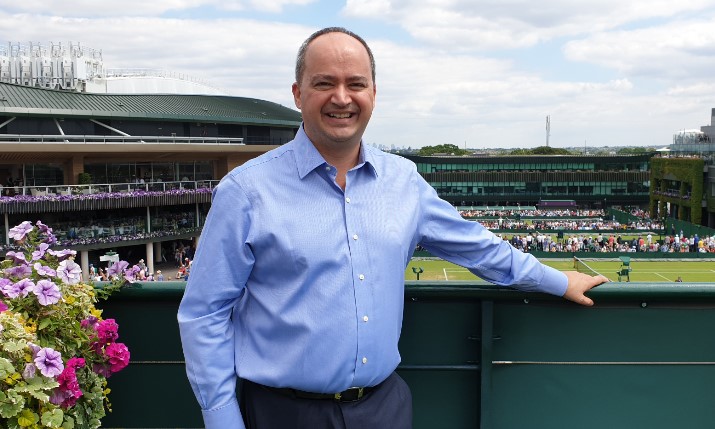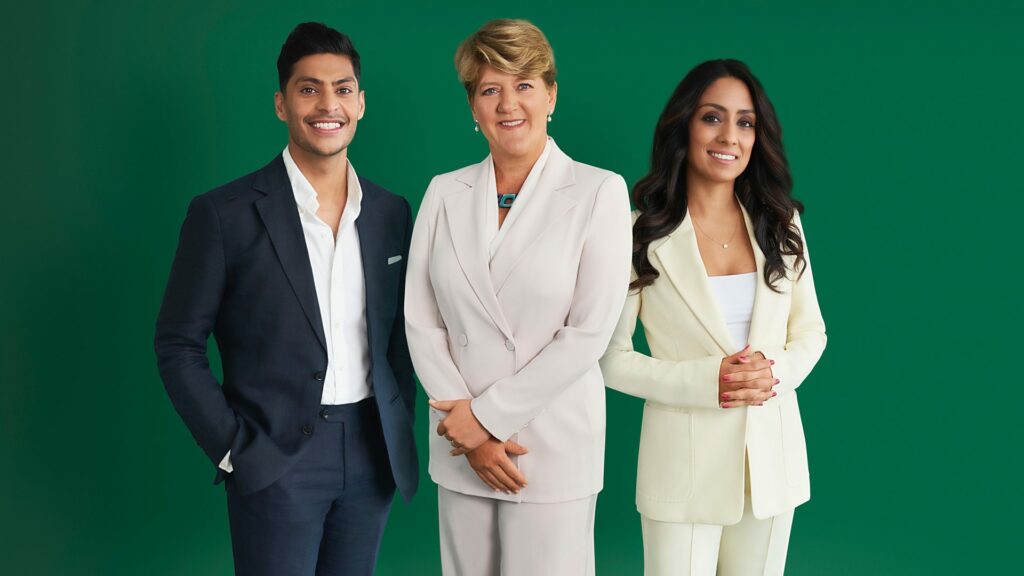Wimbledon 2023: Ron Chakraborty reflects on production schedule changes, a new presenter, and another successful Championships for BBC Sport

BBC Sport’s Ron Chakraborty, lead executive, major events pictured at Wimbledon in 2019
With record viewing figures for the men’s singles final, the BBC had a steller Wimbledon in 2023.
Talking to SVG Europe at the culmination of the Championships, Ron Chakraborty, lead executive, major events at BBC Sport, discusses how this year’s coverage differed from previous editions, and contemplates the sport’s changing of the guard.
SVG Europe: Did you do anything differently with your Wimbledon coverage for 2023 versus 2022?
Ron Chakraborty (RC): The main adjustments to our production revolved around the changes made to the tennis scheduling at Wimbledon in the last couple of years, with later start times and increased intervals between matches meaning that play now regularly runs late into the evening.
Our nightly highlights show had often been squeezed by late matches down the years but over the last couple of Wimbledons it regularly failed to make the air at all which was frustrating given all the work that goes into it. Even though all the day’s matches are available on iPlayer we still felt there is value in a crafted digest of the day’s best action, especially during the week when many viewers will have missed the daytime matches, so we changed the format from a live studio programme to a show that was built off-tape during the day.
As a result, it was always ready to play out at 9pm – if the live tennis had finished it went out on BBC2 but if not it went out on iPlayer and Red Button and was available on catch-up immediately after play finished with a later repeat on BBC2. It worked as both a terrestrial and digital offering, with peaks of 1.5m viewers on BBC2 and over 300k stream requests.
“After experimenting with Wheelchair play on Number 1 Court last year, Wimbledon put all the main finals on there this year which made them a far greater spectacle, especially with the huge increase in camera coverage and replay quality.”
We also adjusted the programme shifts to cope with the longer days, with Isa Guha our ‘early’ presenter for the first eight days working until mid-afternoon and Clare Balding taking over for the evenings. Isa and Clare were part of a new look line-up with Qasa Alom taking over Today at Wimbledon and Andy Stevenson hosting the Wheelchair Finals over the final weekend. We were delighted with how all of them performed.
While all 18 courts were available on iPlayer, along with Centre Court in UHD, we reduced the number of feeds available on the Red Button [interactive service] from six to one, reflecting the priority of online viewing, on iPlayer in particular. It seems to have worked as we once again broke the record for online viewing requests, with a total of 54.3m.
SVGE: This year, you had a new frontperson in Clare Balding. What did she bring to the coverage?
RC: After working on Wimbledon for 30 years, Sue Barker was a broadcasting legend and loved by millions so her departure was always going to be a huge moment in our history of covering the Championships. However, in Clare we have another one of the UK’s best presenters when it comes to sporting major events, and she also has a long history of working on Wimbledon, having joined the radio team in 1995 before switching to TV and presenting Today at Wimbledon from 2015.
As a result, she took over the role very smoothly with her customary energy and enthusiasm but inevitably approached the tennis from a different perspective, often looking at things from a viewer’s point of view as opposed to trying to match Sue’s experience as a tennis player and Grand Slam champion.

SVGE: British participation in the men’s and women’s draws ended early. Did this prompt you to change the way you covered the tournament editorially?
RC: Sadly I’m old enough to remember when the nation went crazy because Jeremy Bates had made the second week of Wimbledon so the prospect of a Championships without significant British success in the singles events is not a new experience! While Andy Murray has been a wonderful gift to our coverage – until the epic Men’s Final the 5m peak for his match against Tsitsipas was still the peak for the Championships – and there were some wonderful moments for the likes of Katie Boulter and Liam Broady, a second week of Wimbledon means we can put the spotlight on some of the new names and storylines who might otherwise have been overshadowed.
There were some great matches in the Women’s draw in particular, and as we approached the climax of the competition you had the prospect of the first Arab Wimbledon winner in Ons Jabeur, or the emotion of Elina Svitolina winning for Ukraine, but in the end they were trumped by the first unseeded woman to win Wimbledon, Marketa Vondrousova, who began the tournament with no sponsors and ended it with the Venus Rosewater dish in her hands.
And in the end, we did have a weekend of British success with Ken Skupski in the Men’s Doubles, Henry Searle in the Boys Singles and Reid & Hewett in the Wheelchair Double so we ended with the best of both worlds.
SVGE: How was the Wheelchair success showcased?
RC: We’ve been showcasing the Wheelchair Finals over the final weekend of the Championships for a number of years now, but this year saw a real step forward in the profile of the event for two reasons. The first was that after experimenting with Wheelchair play on Number 1 Court last year, Wimbledon put all the main finals on there this year which made them a far greater spectacle, especially with the huge increase in camera coverage and replay quality.
The second was a piece of good fortune where both the Women’s Final and Men’s Doubles Final on Saturday afternoon finished quickly in straight sets, which meant we had the airtime to showcase the Men’s Wheelchair Doubles Final featuring Alfie Hewett and Gordon Reid in primetime on BBC1. It ended with a peak audience of over 2m viewers which was a great reward for Gordon and Alfie’s continued success.
SVGE: Now that the tournament is over – what have you learnt from this year and did you achieve what you set out to achieve?
RC: Overall we were really pleased with how Wimbledon 2023 went for us. We set new records for online viewing (54.3m) and listening (1.1m) requests, and continued to buck audience trends in terrestrial viewing by increasing our share for the second year in a row (25.6m), all while bedding in a new presenter line-up. And then of course there was THAT final, which gave us the biggest audience peak (11.3m, plus 4m online) since Andy Murray’s last title in 2016.
Having worked on Wimbledon since 1998 and having had the privilege of watching the Federer, Nadal, Murray and Djokovic era up close, it’s wonderful to see the next generation arrive with such drama and excitement.
Live from Wimbledon 2023:
- Wimbledon Broadcast Services’ Paul Davies on mic’ing up players and boosting behind the scenes access
- Upping UHD-HDR coverage of the Championships
- New production partner Whisper serves up expanded Wimbledon coverage
- ACS delivers more behind the scenes shots
- Moov creates virtual set for Wimbledon Broadcast Services

